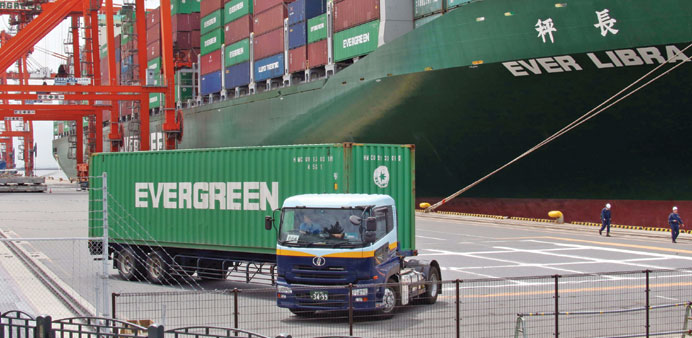A truck loaded with a shipping container leaves the international cargo terminal at Tokyo’s port. Japan swung back to a trade deficit in April after the first surplus in almost three years in March, official data showed yesterday.
AFP/Tokyo
Japan swung back to a trade deficit in April after the first surplus in almost three years in March, but the shortfall shrank drastically year-on-year thanks to stronger exports and lower energy bills, official data showed yesterday.
The monthly deficit came in at ¥53.4bn ($440mn), about one-15th of the ¥825.5bn posted a year earlier, finance ministry data showed.
Exports rose 8% year-on-year chiefly on robust shipments of cars, electronics components and machinery as the yen was 17% cheaper against the dollar than last year.
Imports dropped 4.2% as the cost of oil and gas fell.
By region, US-bound shipments soared 21.4%, far outpacing a 2.4% increase in exports to China and a 0.8% rise in exports to the European Union.
“Japan’s economy will be more robust this year, led by domestic consumption and external demand,” said Yoshitaka Suda, an economist at Nomura Holdings.
“We think that the US economy will continue to recover moderately, helping to boost Japan’s exports,” he told Bloomberg News.
The April data came after a stronger-than-expected economic growth report last week.
Data from the Cabinet Office showed Japan’s economy grew a faster-than-expected 0.6% on-quarter in the first three months of 2015 as it crawls back from a brief recession.
The Bank of Japan on Friday held off launching more stimulus and governor Haruhiko Koroda said the world’s number-three economy was on the upswing after taking a hit from a sales tax hike in April last year.
Since taking office in late 2012, Japan’s prime minister has embarked on a high-profile policy blitz – including big government spending and huge central bank monetary easing – in a bid to end years of deflation and lacklustre growth.
The April deficit was much smaller than market expectations for a deficit of more than ¥300bn although it reversed March’s ¥227.4bn in surplus, which was the first black-ink since June 2012.
Capital Economics expects Japan’s balance to remain in the red in the near term.
“If the exchange rate starts to weaken again in the second half of the year as we expect, crude oil imports will become more expensive again, soon,” said Marcel Thieliant, Japan economist at Capital Economics.
“Overall, therefore, the trade balance will likely remain in the red in coming months.” he said in a note.
Economists at SMBC Nikko Securities said “the trade balance will be likely to move around the break-even point for a while” due to stalling export growth, a pick-up in imports, and an upturn in oil prices.

